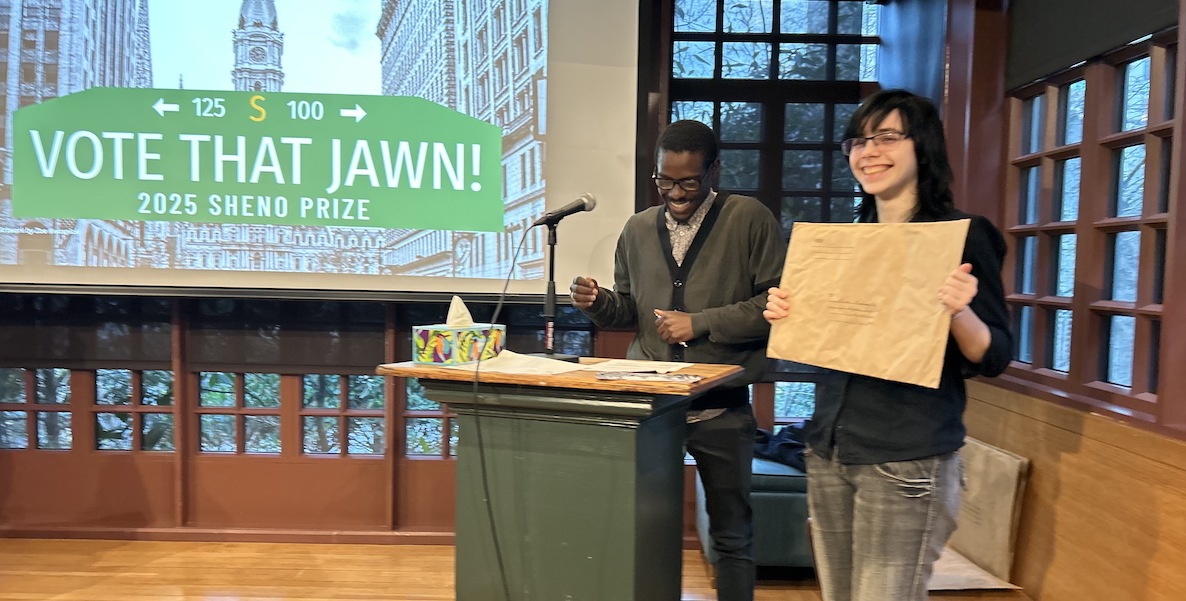My mother’s friends are all immigrants from the former Soviet Union, a melting pot of Eastern European tied together by shared language in a new and unfamiliar country. She’d bring them over once a week and sit them on our overgrown porch, right under the window to my bedroom. I’d listen to them drinking and ranting all night from there.
For the American child, their words were jarring: These women were disillusioned and disinterested in voting. One felt that she didn’t know enough so she voted like her husband. Another didn’t register at all, denouncing it as a complete scam.
EDITOR’S NOTE: Miran Andriyevsky is one of two inaugural recipients of the Erinda Sheno Memorial Prize, a writing contest open to high school and college students. This week, Vote That Jawn, in partnership with Kelly Writers’ House and The Citizen, announced the winners; you can read the winning college essay here.
I spilled this knowledge to a close friend after weeks of thinking. We sat in the middle of the janitor’s closet, globs of paint dropping from the stage crew brushes as we worked to wash them after a long afternoon of working on the school play. I expected shock, even judgement from him — he and his family were African American, and he was the first to tell me how important voting was after his ancestors had spent so long unable to do so. But he just looked away and muttered, under his breath, a similar story to mine.
I realized then, my hands covered in paint and my sleeves wet, that it was bigger than my family — this apathy cut across cultures, backgrounds and generations. My friends told me similar stories with prompting: dads who didn’t vote, aunts who clicked by logo, dozens with no turnout. Even classmates of mine claimed to be “too lazy” to register, utterly nihilistic about their ballots.
I realized then, my hands covered in paint and my sleeves wet, that it was bigger than my family — this apathy cut across cultures, backgrounds and generations.
So when the opportunity for change came, I took it. I applied to be a voting ambassador for My School Votes (MSV), desperate to do something after experiencing the lack of turnout firsthand as a poll worker. They paired me with a girl, a daughter of Chinese immigrants, facing the same problems between family and friends. We wrote down our goals: to emphasize the importance of voting to our communities. We became the heads of the Get Out the Vote! Club with one other student at Masterman School, responsible for the voter turnout in the school.
First we researched: local elections, mail-in ballots, everything discussed in the weekly MSV meetings. Then we put ourselves to work, hours spent planning information sessions and registering eligible citizens. We visited houses, bothered teachers, gave out informational sheets, and hunted down classmates. With the help of our civics teacher, we created valuable opportunities and connections for classmates. We met with Involved at Seventeen, a program offering paid poll work for students too young to vote and an early opportunity to practice civic engagement.
We organized our school’s role in a citywide student voting rally right before the recent election, a walkout to create a sense of camaraderie with other schools and to motivate students to truly participate in the election any way they can. We emphasized community as well as individual voice, how voting connected the two directly.
And right before the November 2024 general election — imagine our buzz as our school hit 100 percent voter registration.
Miran Andriyevsky is a senior at Julia R. Masterman School and the high school winner of the Erinda Sheno Memorial Prize.
Last August, The Citizen was devastated to learn of the passing of Erinda Sheno, a former Citizen intern and passionate young writer. The daughter of loving Albanian immigrants, Sheno attended Benjamin Rush High School and the University of Pennsylvania, where she was an active member of the writing community and of Vote That Jawn, the youth-led movement to encourage voting and civic engagement. In Sheno’s memory, the Vote That Jawn team, led by Penn professor Lorene Cary and Carson Eckhard, established the Sheno Prize in Erinda’s memory. The annual prize goes to a Philadelphia-area high school or college student for an essay about voting, democracy, immigration or Philadelphia life — issues dear to Erinda Sheno.
![]() MORE VOTING STORIES FROM THE CITIZEN
MORE VOTING STORIES FROM THE CITIZEN



